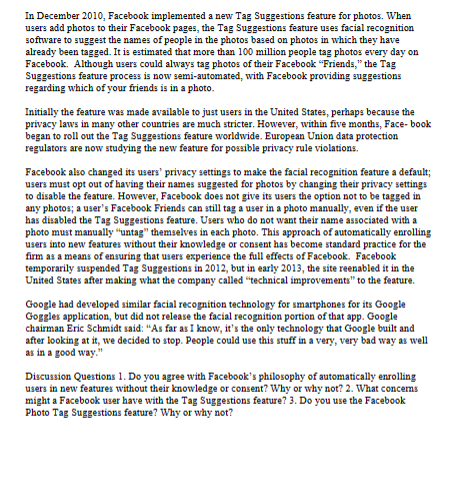Answered step by step
Verified Expert Solution
Question
1 Approved Answer
Facebook Raises Privacy Issues Since its founding in 2 0 0 4 , Facebook has changed dramatically - expanding from a tiny start - up
Facebook Raises Privacy Issues Since its founding in Facebook has changed
dramaticallyexpanding from a tiny startup firm to an Internet powerhouse, with a market
value over $ billion and revenue in excess of $ billion in
Facebook has also changed the way it manages its users' privacygoing from being a private
Web site where you could communicate with just the people you chose to becoming a forum
where much of your information is made public. An escerpt from the earliest Facebook privacy
policy reads: No personal information that you submit to Facebook will be available to any user
of the Web site who does not belong to at least one of the groups specified by you in your
privacy settings. Contrast this with an excerpt from Facebook's privacy policy in : When
you connect with a game, application or website...we give the game, application, or website...
your basic info we sometimes call this your "public profile" which includes your User ID and
your public information. We also give them your friends' User IDs also called your friend list
as part of your basic info. This change in its approach to privacy is causing Facebook to underzo
increasing scrutiny of its policies and actions in terms of safeguarding the information of its
more than million active monthly users.
Most of the Facebook applications, or appi, that enable users to play games and share common
interests are created by independent software developers. In it was uncovered that many of
these apps eg FarmVille, Texas HoldEm, and Frontier Ville were transmitting users' unique
Facebook user IDs to at least two dozen marketing and database firms, where they were used to
build profiles on users' online activities.
Because a Facebook user ID is a public part of all Facebook profiles, knowledge of user IDs
enables a company to determine the users' names even if they set all their Facebook information
to be private; companies can simply perform a search using the ID to find the person's name.
The user IDs may also reveal the users' age, address, and occupation, and can allow a company
to access photos for those users who did not specify the most restrictive privacy setting. At least
one of the companies linked the Facebook data to its own database of Intemet users' data, which
it sells to other marketers.
Interestingly, Facebook prohibits app developers from sharing data about users to outside
marketing and database companies. However, it has been difficult for Facebook to enforce its
rules for the more than half million apps that run on its Web site. Facebook itself was caught
transmitting user ID numbers under certain conditions when users clicked on an ad; Facebook
discontinued the practice after it was reported in the press.In December Facebook implemented a new Tag Suggestions feature for photos. When
users add photos to their Facebook pages, the Tag Suggestions feature uses facial recognition
software to suggest the names of people in the photos based on photos in which they have
already been tagged. It is eatimated that more than million people tag photos every day on
Facebook. Although users could always tag photos of their Facebook "Friends," the Tag
Suggestions feature process is now gemiautomated, with Facebook providing guggestions
regarding which of your friends is in a photo.
Initially the feature was made available to just users in the United States, perhaps because the
privacy laws in many other countries are much stricter. However, within five months, Face book
began to roll out the Tag Suggeations feature worldwide. European Union data protection
regulators are now studying the new feature for possible privacy rule violations.
Facebook also changed its users' privacy settings to make the facial recognition feature a default;
users must opt out of having their names suggested for photos by changing their privacy settings
to disable the feature. However, Facebook does not give its users the option not to be tagged in
any photos; a user's Facebook Friends can still tag a user in a photo manually, even if the user
has disabled the Tag Suggestions feature. Uvers who do not want their name associated with a
photo must manually "untag" themselves in each photo. This approach of automatically enrolling
users into new features without their knowledge or consent has become standard practice for the
firm as a means of ensuring that users experience the full effects of Facebook. Facebook
temporarily suspended Tag Suggestions in but in early the site reenabled it in the
United States after making what the company called "technical improvements" to the feature.
Google had developed aimilar facial recogrition technology for smartphones for its Google
Goggles application, but did not release the facial recognition portion of that app. Google
chairman Eric Schmidt said: As far as I know, it's the only technology that Google bri

Step by Step Solution
There are 3 Steps involved in it
Step: 1

Get Instant Access to Expert-Tailored Solutions
See step-by-step solutions with expert insights and AI powered tools for academic success
Step: 2

Step: 3

Ace Your Homework with AI
Get the answers you need in no time with our AI-driven, step-by-step assistance
Get Started


